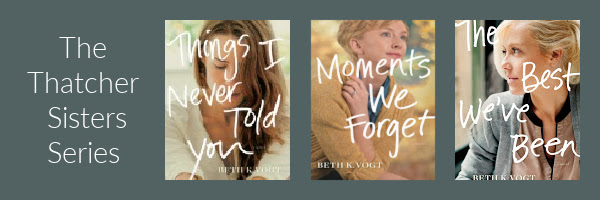by Beth K. Vogt, @bethvogt
I was watching Chopped, a popular cooking competition on The Food Network, when one of the judges taught me something about writing.
Just in case you’re not familiar with Chopped, here’s the premise: It’s a cooking competition in three rounds: appetizer, main course, and dessert. Chef-contestants are presented with a basket of mystery ingredients. They have 20-30 minutes to prepare their courses and then their dishes are judged by a panel of three award-winning, celebrity chefs. The losing contestant in each round is – you guessed it – chopped.
During one of the rounds in a recent episode, a judge offered feedback to a contestant about his dish. “You used too many ingredients,” he said. “Too many spices. Your dish became muddled.”
Ping!
A celebrity chef on a cooking show was talking my language. Like me, maybe you’ve attended writing workshops about how the middle of a novel can get muddled. How to untangle that muddled mess so readers aren’t lost, confused, and frustrated – not to mention a writer’s frustration when faced with such a mess.
The Chopped judge also told the contestant how to correct the problem with his dish – and at the same time he also solved the problem of a novel’s muddled middle.
Avoid too much stuff.
If you’re writing your rough draft and you get to the middle of your story and it’s a muddled mess: Stop. The problem may very well be you’ve got too much going on.

Back up. Re-evaluate. Streamline your plot.
When we first plot a novel, we can overthink our storyline. We’re like chefs who open the pantry and grab too many spices because, well, a little bit of this and a little bit of that and a dash of that can’t hurt, can it?
Yes, yes, it can.
A skilled chef knows which spices to add to a dish to make the flavors sing. A skilled chef also knows too much spice or too many added elements – think peppers, potatoes, onions, and garnishes – will overpower a good cut of meat, creating culinary chaos.
A skilled writer learns how to layer in just the right amount of tension, rather than pages and pages of unnecessary conflict. Remember: tension and conflict are two different things. A wise writer knows how many subplots their story can carry – and how many subplots they can write well, for that matter.
If you’ve lost track of your characters, maybe they’re lost in an overcrowded plotline. Ask yourself:
- Does my story have too many secrets?
- Does my story have too many main characters? Too many minor characters?
- Has my story veered from the Story Question or main theme?
- Is my story staying true to its genre?
- Does my story have too much conflict and not enough tension?
Confronting a muddled middle? Ask yourself: Have I thrown too much stuff into my manuscript?

The Thatcher Sisters Series, published by Tyndale House, is a three-book “Little Women gone wrong” women’s fiction collection. Examining the complicated relationships between sisters, the series includes Things I Never Told You, which won the AWSA 2019 Contemporary Novel of the Year, Moments We Forget, and The Best We’ve Been, a 2021 Selah finalist.

Beth K. Vogt is a non-fiction author and editor who said she’d never write fiction. She’s the wife of an Air Force family physician (now in solo practice) who said she’d never marry a doctor—or anyone in the military. She’s a mom of four who said she’d never have kids. Now Beth believes God’s best often waits behind the doors marked “Never.”
Beth is a 2016 Christy Award winner, a 2016 ACFW Carol Award winner, and a 2015 RITA® finalist. Her 2014 novel, Somebody Like You, was one of Publisher’s Weekly’s Best Books of 2014. A November Bride was part of the Year of Wedding Series by Zondervan. Having authored 10 contemporary romance novels or novellas, Beth believes there’s more to happily-ever-after than the fairy tales tell us.
An established magazine writer and former editor of the leadership magazine for MOPS International, Beth blogs for Learn How to Write a Novel and The Write Conversation and also enjoys speaking to writers group and mentoring other writers. She lives in Colorado with her husband Rob, who has adjusted to discussing the lives of imaginary people. Connect with Beth at bethvogt.com.
